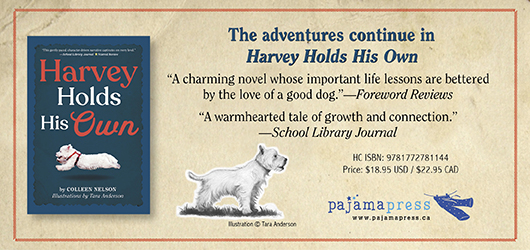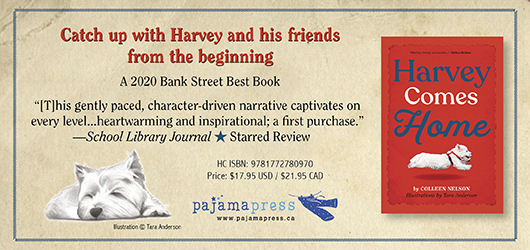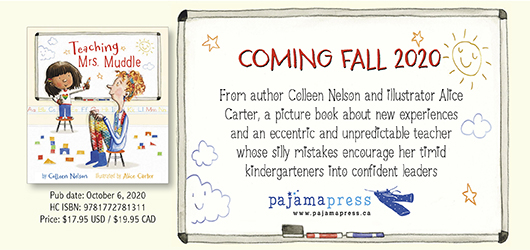Reviewer Catherine Thureson Interviews Colleen Nelson, Author of Harvey Holds His Own
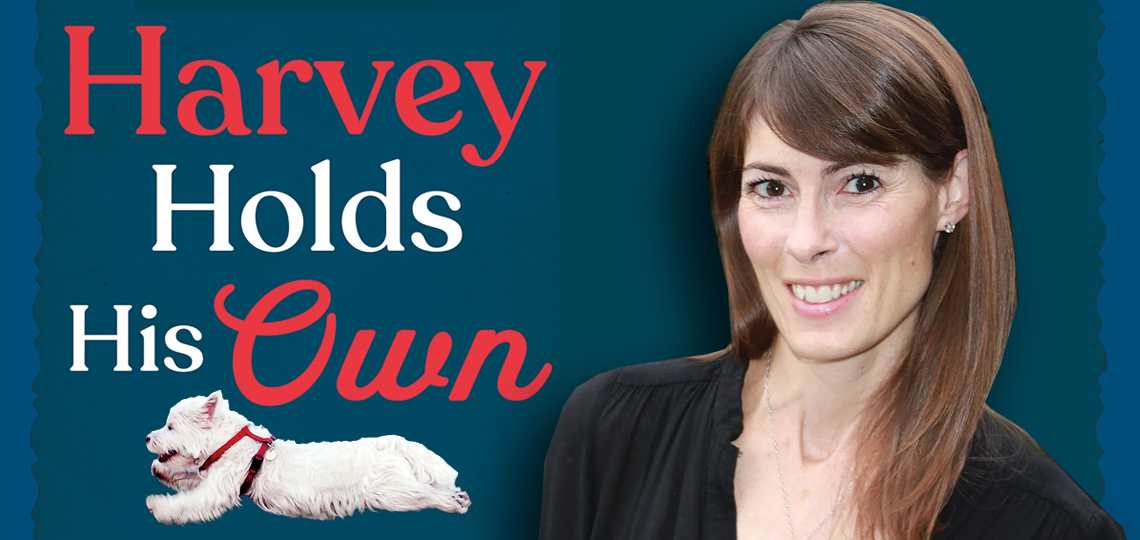
From news desks to local commercials, it seems all we’ve heard about over the past several months is how “unprecedented” and “uncertain” these times are. While that could hardly escape most of us who are living daily in this unprecedented uncertainty, we would appreciate an escape from it every now and again, but wading through the quagmire of newspapers and social media for a glint of brightness is an emotionally exhausting task.
So, here’s a pick-me-up delivered direct to your inbox: throughout the COVID pandemic, pet adoptions and fosters have soared, with many shelters even experiencing waves of being completely emptied out. While these may be uncertain times for us humans, thousands of cats and canines around the world are discovering the joy and security of a forever home as people decide to make one of their “someday” goals happen today. There’s very little we can all agree on, but appreciation for the love of a furry friend does appear to be one of the great unifiers.
Author Colleen Nelson, it seems, was ahead of this curve when she started a juvenile fiction series about a little Westie named Harvey, who touches—and betters—the lives of everyone he meets. In the second installment in the series, Harvey Holds His Own, Harvey is back at the retirement home with his beloved owner, Maggie, and Austin, the boy who rescued him when he got lost the previous year. With the help of Harvey’s indomitable spirit, the two middle schoolers overcome the tensions between them and unite to brighten the lives of residents at Brayside Retirement Villa.
In her review for the July/August issue of Foreword Reviews, Catherine Thureson called Harvey Holds His Own “a heartwarming novel … about friendship, loyalty, and the importance of staying true to oneself, no matter the obstacles.” We reached out to Colleen for an interview, and connected her with Catherine to learn more about this pup and his people.
Take it away, Catherine!
Harvey’s perspective seems remarkably realistic. How are you able to get into a dog’s head to so believably present his point of view?
Thank you, I’m glad it came across that way! I started the first Harvey book with a very clear picture of who this little Westie was. He already felt like a fully formed character. A lot of the believability comes from watching my West Highland Terrier, Rosie, who we got while I was writing Harvey Holds His Own. Our first Westie died about ten years ago and I had been in a long negotiation process with my husband since then. Watching how Rosie interacts with the world, and remembering our first Westie, were excellent inspirations for Harvey.
I also did a lot of research on dog psychology and what they perceive about the world around them. Their sense of smell, for example, and the way they read people. I teach grade 8 and bring Rosie to school with me once or twice a week. One day when she was at school, a new student arrived from Brazil and spoke almost no English—she was obviously anxious about her first day. Rosie lay at her feet for the whole morning and every so often my student would reach down and pat her. They were bonded from that day on. Another time, one of my students got emotional speaking about her grandfather. Rosie wandered over from where she was and sat beside her. I think those moments of instinctive empathy are what make pets such an important part of people’s lives. Not every dog is right for a classroom setting, but Rosie certainly is.
Maggie and Austin spend much of their time in a retirement facility, befriending the residents. Can you talk about the value of kids spending time with an older generation?
To me, that aspect of the story is the most important. I was very close with my grandparents and used to love listening to their stories. Both of the Harvey books are based on their lives. I’ve also borrowed stories from my in-laws’ and my parents’ childhoods. I remember when my grandma was in a retirement home and outside of everyone’s rooms were photos of their younger selves, just like at Brayside. Sometimes it’s hard to remember that an old person was once a young person with hopes and dreams for their future. Sharing stories like the ones the old people share is a good reminder to readers, and, of course, to Maggie and Austin.
Maggie is struggling between wanting to follow her own path and wanting to maintain her relationship with her two best friends. What advice would you offer Maggie? What advice would you offer her friends?
As I mentioned, I teach grade 8 and was once a girl in grade 8, so not only do I see situations like Maggie’s at school, I’ve lived through them. Lots of times at school, I see kids trying to hang on to relationships when it’s obvious the friendship is going in a different direction. I think being true to yourself and having the confidence to be who you want to be, not who others think you should be, is really important.
Maggie knows she and her friends are growing apart, but it’s always hard to let go. Even with my own kids (I have two boys) I see how interests between friends change once puberty hits. We have a funny story about my older son when he was twelve. He was completely baffled about why one of his friends would rather go to a dance with girls instead of going to a hockey practice. It made no sense to him. He’s fifteen now, and I think he’d probably still pick hockey over a dance.
I really like the burgeoning relationship between Maggie and Austin. They are more alike than either of them realizes. I’m working on a third book and want to explore how their friendship will evolve.
There are many lessons that can be learned from this book—about friendship; respecting one’s elders; learning from history; and about protecting the people, places, and dreams that matter most. Is there one takeaway that you most want readers to get?
I try not to hit anyone over the head with a lesson, but they do seem to sneak into the writing one way or another. All of the lessons you mentioned were important to the story, but I think empathy is the overarching lesson that comes across through all the stories. I love highlighting the goodness in people. A lot of times my students are the best teachers.
I’ll give you an example. During COVID when the kids were learning from home, one of my students asked if she could arrange for students from our school to make cards and drop them off to the neighborhood retirement home. Her reasoning was that it was hard for her to be stuck at home without seeing her friends, but she was surrounded by her family. She thought it must be really sad for some of the old people who couldn’t see people they loved and wanted to cheer them up.
Hearing a thirteen-year-old come up with this idea and then put it in action (she collected over 200 cards) is exactly the kind of empathy we need to hear more about, especially during times like today. It isn’t just the elderly who have things to teach us. (That student was Kareen Svechin, in case she reads this.)
Mrs. Fradette’s stories about being a female mechanic in the 1950s are fascinating and the history really comes to life. Do you have any suggestions for readers who would like to explore this topic more, or who may just want to learn more about history in general?
Yes, they should all talk to my Uncle Wayne in Arnprior, Ontario. Just kidding. I am so lucky to have someone in my family who has such an amazing memory for details. I was trying to narrow the time period down for the book and figure out what story the old person would tell. In the first Harvey book, I used a story that Uncle Wayne had about my grandpa’s three-legged dog, General, who scared away some horse thieves. In this book, Wayne told me about my great-grandpa’s mechanic garage. Josephine Fradette isn’t a real person, but I did discover that a woman named Jeanne Brault from Quebec was Canada’s first certified female mechanic. No doubt, she was a gutsy lady and a trail blazer—it was the 1950s and gender stereotypes were a lot different. Her story was what inspired Mrs. Fradette’s journey.
I’m glad you think the history came to life. I’m conscious of not wanting the book to get too bogged down with details, yet still give a full picture of life during a time period. Because my uncle has this amazing memory for small details, he was able to give me tidbits of information that helped with the story. I have pages and pages of notes from our conversations.
What are you working on now?
Right now, I have some copy edits to do on Underland, the sequel to Pulse Point, then I want to revise a book I worked on this year called The Umbrella House, about two kids who are trying to save their building in the East Village of New York City. And then, I’ll dig into the next Harvey book. I have about a third of it written and want to get other projects off my plate so I can dive into it without distraction. I’ve got my first picture book out this fall. It’s called Teaching Mrs. Muddle. I actually started out wanting to write picture books, but it took me fifteen years and twelve other books to figure it out!
Harvey Holds His Own
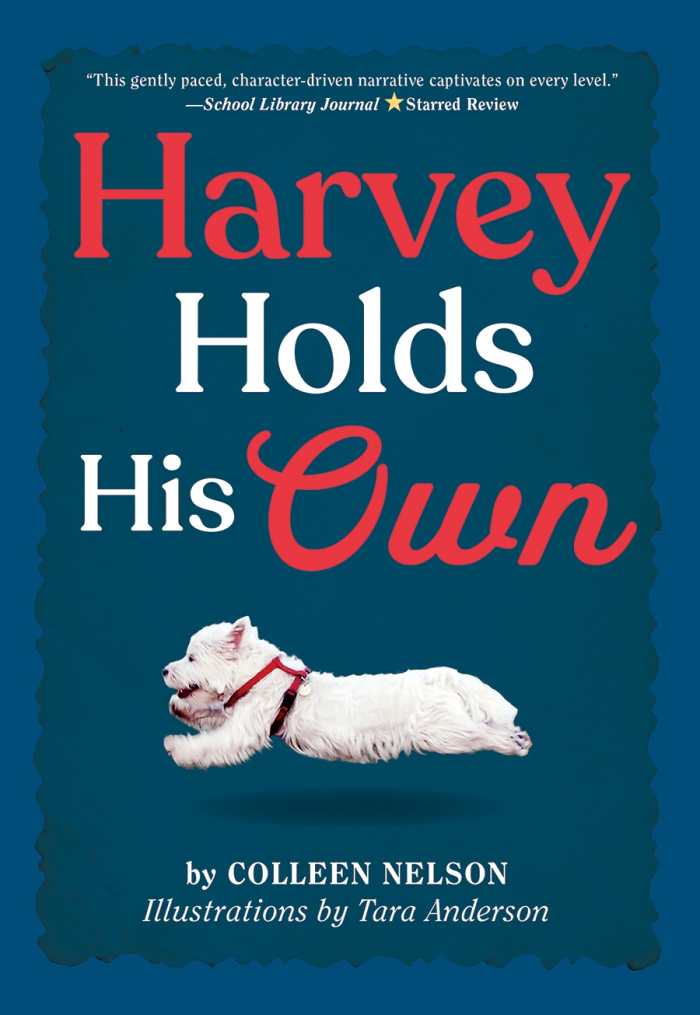
Colleen Nelson
Tara Anderson, illustrator
Pajama Press
Hardcover $18.95 (288pp)
978-1-77278-114-4
Buy: Local Bookstore (Bookshop)
Colleen Nelson’s heartwarming novel Harvey Holds His Own is about friendship, loyalty, and the importance of staying true to oneself, no matter the obstacles.
For twelve-year-old Maggie, seventh grade at St. Ambrose Academy includes twenty hours of mandatory volunteer work. Maggie decides to spend her hours at the Brayside Retirement Villa, where Austin—who found Harvey, Maggie’s spirited terrier, when he got lost the previous fall—works with his grandfather. Though Maggie resents Austin for not trying to return Harvey, Brayside is familiar and seems like a nice place.
The story alternates between the perspectives of Maggie, Austin, and Harvey. Maggie allows Austin to take care of Harvey for her while she gets to know a new resident, Mrs. Fradette. While Austin and Harvey spend time with the other residents, worrying over the fate of Austin’s grandfather’s job and finding an abandoned puppy behind a dumpster, Mrs. Fradette tells Maggie stories of a great flood and about learning to be a woman mechanic in 1950. These stories teach Maggie about perseverance in the face of adversity and about living an authentic life. They also help her to deal with her difficulties with her two best friends, whose interests seem to be going in different directions than her own.
Harvey’s love for his people, his desire to protect his territory, and his curiosity for the world around him are authentic reflections of canine personalities. The memories that Mrs. Fradette shares are interesting for their glimpses into the past, and Maggie and Austin both navigate difficult situations with maturity and consideration for those around them.
Harvey Holds His Own is a charming novel whose important life lessons are bettered by the love of a good dog.
CATHERINE THURESON (June 27, 2020)
Danielle Ballantyne

